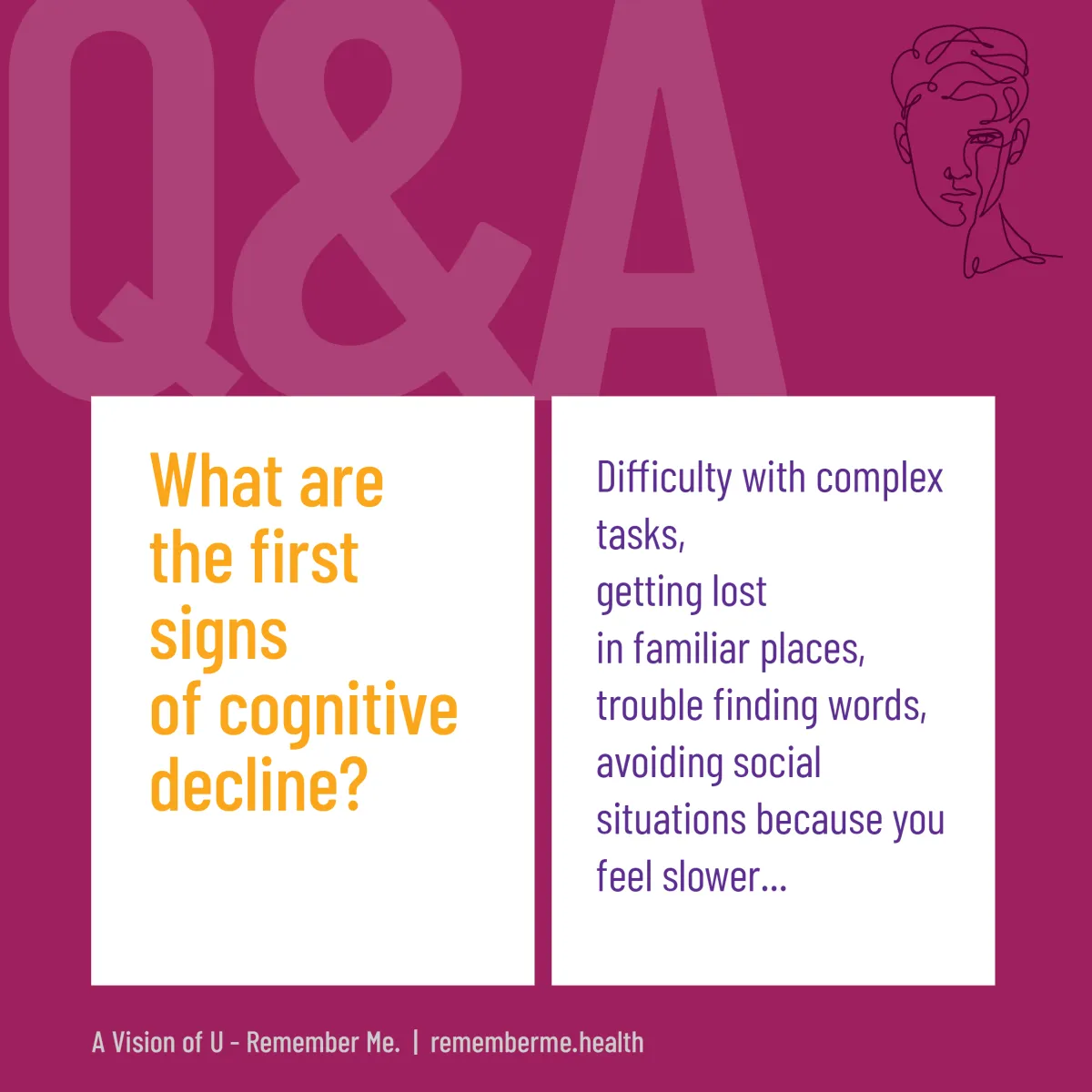
RESOURCES
Truth-telling resources designed to provoke, challenge, and inspire action.

Q & A's
Real Questions, Honest Answers
The questions everyone asks but rarely get straight answers to. No medical doublespeak, no false reassurance—just direct responses to what you really want to know about cognitive loss and recovery.

Q: "What are the first signs of cognitive decline?"
A: "Difficulty with complex tasks, getting lost in familiar places, trouble finding words, and avoiding social situations because you feel 'slower.'"
"The first signs aren't memory problems. They're the things you're probably ignoring right now."
You're waiting for dramatic memory loss, but cognitive decline starts subtly. Struggling with tasks that used to be easy. Taking longer to make decisions. Avoiding conversations because you can't find words. Feeling overwhelmed by things that never bothered you before. You dismiss these as "stress" or "tired" when they're actually your brain asking for help.
Which of these "first signs" have you been dismissing as something else? Stop making excuses and face reality.

Q. "What should you do for memory loss?"
A: "Stop panicking and start investigating. Rule out medications, infections, deficiencies, and sleep issues before assuming the worst."
"Your first instinct is to panic and Google scary diseases. That's exactly the wrong approach."
Memory problems make people catastrophize immediately. "It must be Alzheimer's!" But smart people investigate systematically. Check your medications - are you on anything that affects cognition? Rule out infections, vitamin deficiencies, thyroid issues, depression. Most memory problems have simple, fixable causes. But panic makes you skip the obvious and jump to the terrifying.
What obvious, fixable causes have you actually ruled out? Make a list of what you've investigated versus what you've assumed.

Q: "Can hearing or vision loss cause cognitive decline?"
A: "Yes. When your brain can't get clear input from your senses, it starts to atrophy. Untreated hearing loss doubles dementia risk."
"You're so worried about your brain, you're ignoring the inputs that keep it alive."
Your brain needs constant, clear input to stay sharp. When you can't hear well, your brain stops processing complex auditory information. When you can't see clearly, visual processing centers shut down. This isn't just about communication - it's about giving your brain the stimulation it needs to survive. Every day you delay getting hearing aids or glasses is another day of brain atrophy.
When did you last get your hearing and vision checked? And more importantly, if you need aids/glasses, are you actually using them?

Q: "What are the red flags for Alzheimer's?"
A: "Getting lost in familiar places, repeating the same questions, poor judgment with money, personality changes, and difficulty completing familiar tasks."
"Red flags aren't subtle hints. They're your brain screaming 'EMERGENCY' while you pretend everything's fine."
Red flags are called that because they demand immediate attention. Getting lost driving to places you've been hundreds of times. Asking the same question every five minutes. Giving money to obvious scams. Becoming paranoid or aggressive when you used to be calm. These aren't "bad days" - they're emergencies. But you keep explaining them away because facing the truth is terrifying.
How many red flags are you currently explaining away? Count them honestly and share the number.

Q: "What is it like to have Alzheimer's?"
A: "Early stages: Knowing something's wrong but not being able to fix it. Later stages: Living in fragments of memories while the present disappears."
“Having Alzheimer's isn't just forgetting. It's watching yourself disappear while being powerless to stop it."
Early on, you know you're losing things - words, memories, abilities. You try to hide it, compensate, pretend it's not happening. Later, the present becomes confusing while old memories feel more real. You might not recognize your own family but remember your childhood clearly. It's not just memory loss - it's losing the thread that connects you to now, to here, to who you are.
This is what's at stake. What are you willing to do to prevent this from being your story?

q. "how does alzheimer's change the brain?"
A: "It creates toxic protein plaques and tangles that kill brain cells, starting in memory centers and spreading throughout the brain, causing significant brain tissue loss."
"Alzheimer's doesn't just affect memory. It's progressive brain destruction that eventually impacts all brain functions."
Toxic proteins accumulate in your brain like rust on metal. They kill cells in the hippocampus first (memory center), then spread to areas controlling language, reasoning, and eventually basic functions like swallowing and breathing. Your brain literally shrinks as cells die. By the advanced stages, there is significant brain tissue loss and widespread damage throughout the brain. This isn't just "getting forgetful" - it's systematic brain destruction.
Knowing this is what Alzheimer's actually does to your brain, what are you doing TODAY to prevent it?

Q: "What are the 7 signs of Alzheimer's?"
A: "1. Memory loss 2. Difficulty planning 3. Confusion with time/place 4. Vision problems 5. Language trouble 6. Poor judgment 7. Personality changes."
"Seven signs, and you're probably explaining away at least three of them right now."
Memory loss disrupting daily life. Problems with planning or solving problems. Confusion with times or places. Changes in vision and spatial relationships. New problems with words. Decreased or poor judgment. Changes in mood and personality. These aren't separate issues - they're a pattern. Stop treating each sign like an isolated incident and see the bigger picture.
How many of these seven signs are you currently experiencing or explaining away? Count them and be honest.

Q: "How can you tell if a person has Alzheimer's or dementia?"
A: "You can't tell the difference without proper testing. That's why professional evaluation matters more than guessing."
"You're playing amateur neurologist when you should be getting professional answers."
Family members spend months debating whether it's "just dementia" or "real Alzheimer's." Meanwhile, the person's condition progresses while you argue about labels. You can't diagnose this from Google searches or family discussions. You need neuropsychological testing, brain imaging, and professional evaluation. Stop guessing and start getting answers.
Are you still guessing about what's happening, or have you gotten professional evaluation? What's stopping you from getting real answers?

Q: "Why am I losing so much of my memory?"
A: "Memory loss results from multiple factors working together - some you can control through lifestyle choices, others like genetics and age you cannot."
"You're not losing memory randomly. But it's more complex than just lifestyle - genetics, age, and medical factors all play important roles."
Poor sleep, chronic stress, processed foods, sedentary lifestyle, and social isolation can all contribute to memory problems. But so can genetics, normal aging, medical conditions, and medications. The memory loss you're experiencing likely results from multiple factors working together, not just one cause.
The key is identifying which factors you CAN influence and taking action on those while getting proper medical evaluation for factors you can't control.
Which factor do you have the most control over right now: sleep quality, stress management, physical activity, or social connections? Start there.

Q: "How do you treat cognitive decline?"
A: "You address it through comprehensive evaluation to identify causes, then use targeted interventions - some decline can be slowed or improved, but not all can be reversed."
"Smart treatment means understanding what you're dealing with first, then using every available tool to maintain and support brain function."
Some cognitive decline has treatable underlying causes - depression, medication effects, sleep disorders, nutritional deficiencies. Other types can be slowed through lifestyle interventions, new medications, and comprehensive care approaches. The goal is maintaining function and quality of life as long as possible.
Stop thinking one-size-fits-all and start thinking personalized approach based on YOUR specific situation and causes.
Are you taking a comprehensive approach with proper evaluation and multiple interventions, or hoping for a single solution? What's missing from your current strategy?

Q: "What does cognitive loss mean?"
A: "A decline in thinking abilities like memory, attention, language, and problem-solving that interferes with daily activities and independence."
"Most people use the term 'cognitive loss' without actually knowing what it means."
Cognitive loss isn't just "getting older" or "being forgetful." It's when your brain loses the ability to think, remember, focus, solve problems, or use language effectively enough to live independently. It's not cute "senior moments" - it's measurable decline in mental abilities that affects your daily life. If you can't define what you're experiencing, you can't fight it effectively.
Did you actually know what cognitive loss meant before reading this?

Q: "What is meant by cognitive loss recovery?"
A: "The improvement of cognitive abilities when underlying treatable causes are addressed, or the slowing of progression through comprehensive interventions - proving that decline isn't always inevitable."
"The word 'recovery' applies to some types of cognitive problems. The key is knowing which types and taking action accordingly."
True recovery is possible when cognitive decline has treatable underlying causes - depression, vitamin deficiencies, medication effects, sleep disorders, infections. Significant improvement and slowing of progression is possible with early intervention for many other conditions. But not all cognitive decline is reversible.
The tragedy is that people give up without ever investigating what type they're dealing with or what interventions might help. Hope paired with realistic expectations and proper evaluation is the right approach.
Do you know what type of cognitive issues you're dealing with, or are you assuming they're all the same? What would proper evaluation tell you?









This program is designed to complement medical care and is based on lifestyle interventions supported by current research. While 92% wait for pharmaceutical solutions, this course provides evidence-based tools you can use immediately. The information provided is not intended to diagnose, treat, cure or prevent any disease. Results may vary.
Privacy Policy | Terms & Conditions | © 2025 AVOU&Me LLC